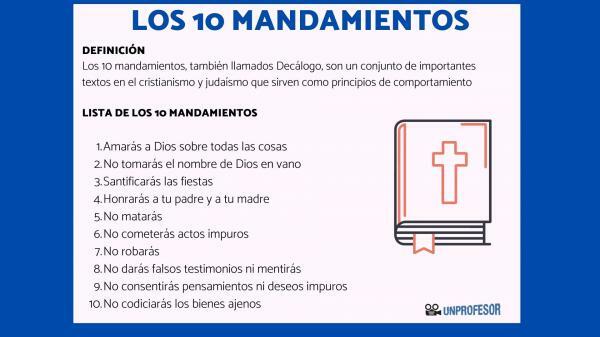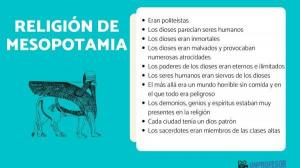The 10 COMMANDMENTS of Moses and their Christian meaning

Image: Wix.com
All the great religions of the world have a series of texts in which they talk about their beliefs and a series of norms that must be followed in order to comply with religious values marked, being the case of the Catholic Church the Bible and the commandments. To know these ethical principles that mark the path of Catholics in this lesson from a PROFESSOR we are going to talk about the 10 commandments and their meaning.
The 10 commandments, also called Decalogue, are a set of important texts in Christianity and Judaism that serve as principles of behavior, necessary to maintain the moral values suggested by both religions. The commandments can vary according to religion, but they are usually quite common with each other.
It is said that the tablets on which the tablets of the commandments were written were written by God himself, being these delivered to Moses on his march up Mount Sinai. When Moses went down to the foot of the mountain, this being the place where the Hebrew people awaited the return of his leader, he found that after his departure the people He had stopped worshiping God, worshiping a pagan symbol represented by a golden calf, which angered Moses so much that he threw the tablets to the ground breaking them.
Moses asked God for forgiveness and said not to take the action into account and that rewrite the tablesThis is how the tables of the 10 commandments were established. Next we are going to analyze the 10 commandments and their meaning so that you can better understand the Christian ideology.

Image: Jewish Link
To continue this lesson on the 10 commandments and their meaning, we must list the Decalogue, being in this case those that are established in the catholic version. For this reason, in the following lines we are going to name the commandments and briefly explain their meaning.
You will love God above all things
Catholicism is a monotheistic religion, that is, only one god is worshiped. God is the main figure of religion, so this commandment means that you have to love him for the importance of him as creator of everything and spiritual guide, and follow his thoughts and scriptures.
You will not take God's name in vain
The second commandment talks about the ways in which we use the word of God to swear or to blaspheme. It also refers to the fact that different gods will not be worshiped, since the only god you must worship is the Christian God. For all these reasons, many of the bad words that we make violate this commandment.
You will sanctify the holidays
The third of the 10 commandments of Moses does not refer to all holidays, but speaks of the different Christian holidays that should be celebrated because of their Christian relationship. Even more important is the other part of the commandment, according to which one should keep the Sabbaths holy and attend church masses, being days of rest in which Christians must rest and worship God.
You will honor your father and mother
The meaning of this commandment is the unconditional love that you must have for your parents, paying attention to them in all the orders that they make to you, since those people who follow the orders of their parents will not commit sins. There is no mention in this commandment of the possibility of wicked parents breaking the commandments, in which case the fourth commandment would clash with the rest.
You will not kill
The fifth of the 10 Christian commandments is one of the most direct and talks about the murders, making it clear that whoever follows the designs of God must not kill any person, whatever the motive, at the same time that he denies violence, and any kind of fighting including wars.
Thou shalt not commit impure acts
The sixth commandment talks about the rest of our body, denying lust, adultery and other morally questionable acts that have to do with sexual relations. We must bear in mind that the commandment only speaks of actions, since thoughts are not included within the sixth commandment.
You will not steal
The seventh commandment is just as direct as the fifth, speaking about God's followers not stealing anything, or Even in the case of poverty and the possibility of starvation, these people should not steal food or any type of wealth. There is no mention of any case in which theft is well regarded by the Christian people.
You will not give false testimonies or lie
The eighth commandment talks about one of the main themes of Christianity, directly confronting the lie, and denying any kind of it. There is talk of all kinds of lies, even if they are good lies told to do no harm, nor should they be used.
You will not indulge in impure thoughts or desires
The commandments not only deal with issues related to actions, but this ninth commandment also talks about not thinking about the negative actions discussed in the rest of commandments. It is one of the most complicated commandments to fulfill, due to the difficulty of managing the human mind.
You shall not covet
And we finish this list with the 10 commandments and their meaning to talk about the tenth commandment that is related to one of the seven deadly sins: greed. This commandment talks about not coveting or wanting anything from your neighbor, trying to avoid envy in your body. It is an important commandment since greed can lead to breaking some of the previous commandments.

Image: Aciprensa
The 10 Christian commandments are also known as "Decalogue"And, as its name indicates, it is a series of" commandments ", that is, forms of conduct that are defended in the Christian religion. Within of Judaism and Christianity These commandments are of crucial importance, as they include some moral and ethical principles as the worship of the only God, avoid dishonest behavior, do not kill or harm others, etc.
The 10 commandments of the Bible that we have shared here are those of Christianity; Depending on the traditions, these may vary slightly. In the biblical text, the commandments appear in two crucial moments: in Exodus and Deuteronomy.
The commandments in the Exodus
In this book of the Bible it is said that the commandments were written by God on two tables made of stone and that he gave them to Moses. He came down from Mount Sinai to spread the word of God, but he broke the boards when he saw that they were worshiping a calf. God encouraged Moses to forgive the ignorance of the people and encouraged him to rewrite the commandments on two pieces of stone.

Image: Arguments
As we have already commented, within Judaism the 10 divine commandments also have great relevance. Specifically, the 10 Jewish commandments indicate that God spoke these commands and that, later, he announced them individually in the Torah. The explanation given by Orthodox Judaism refers to the fact that each of the commandments were addressed to each of the Jews so that all people would hear and understand them.
This explanation is not consensual within the Jewish community and, in fact, the most conservative reject the idea that it was God himself who named the commandments. They consider that the Torah was drawn up from different sources and that, therefore, it is not directly the divine word.
Anyway, the 10 Jewish commandments they are divided as follows:
- "I am the Eternal, your God, who brought you out of the land of Egypt, out of the house of slavery."
- «You will not have nor will you recognize other gods in my presence outside of me. You shall not make for yourself a carved image or any likeness of that which is above in the heavens, nor on earth, nor in the water, nor under the earth. You will not bow down to idols, nor will you worship them, for I am the Eternal, your God, the only God, who has in mind the sin of parents on children up to the third and fourth generation with my enemies; but who shows benevolence with thousands of generations to those who love me and observe my precepts ».
- "You shall not take the name of the Eternal, your God in vain, because the Eternal will not hold anyone who takes his name in vain".
- «Remember the Sabbath day to sanctify it. Six days you will work and you will do all your work; but the seventh day is Shabbat for the Eternal, your God; you will not do any work, neither you, nor your son, nor your daughter, nor your servant, nor your servant, nor your beasts of burden, nor the stranger who lives within your walls, for in six days the Eternal made heaven and earth, the sea and all that is in them, and on the seventh day Rest. For this reason, the Eternal blessed the Sabbath day and sanctified it ».
- "Honor your father and your mother, so that your days may be prolonged on the earth that the Eternal, your God, gives you."
- You shall not kill.
- "You shall not commit adultery."
- "You shall not steal."
- "Do not bear false witness against your neighbor."
- "You shall not covet. You shall not covet your neighbor's house; you shall not covet your neighbor's wife, or his male servant, or his female servant, or his ox, or his donkey, or anything that belongs to your neighbor.



